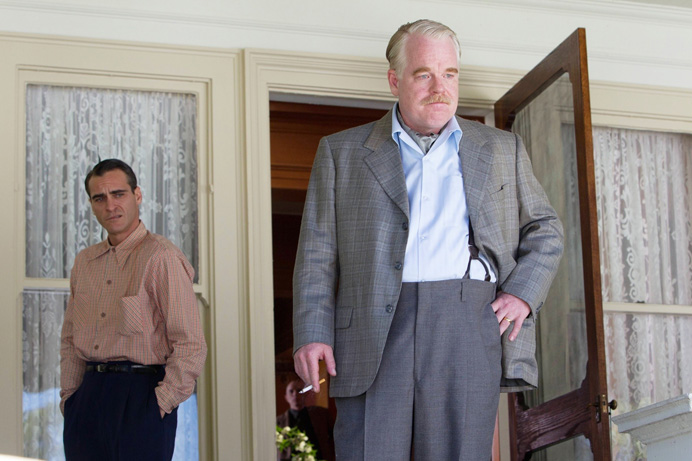
The Master (2012)
Written and Directed by Paul Thomas Anderson
144 min.
Fairly light on spoilers, but see the movie first.
This is a review I’ve been meaning to write ever since Greg’s scathing take. He’s completely wrong about the film, but wrong in a Greg way, which is to say, entirely consistent with how he views films, so s’all good—I expect nothing less from him, and love him for it. But, the thought of his take being the only take on the film on this site just isn’t right, because it’s a great goddamn film. And in the wake of Philip Seymour Hoffman’s passing, it’s certainly been on my mind, given its central theme of addiction—a theme that has, for some reason, eluded many critics.
The infatuation between Freddie Quell (Phoenix) and Lancaster Dodd (Hoffman) is never outright, hammer-over-the-head explained in The Master, leaving many viewers—and even professional reviewers—to come to the most obvious and tittilating and childish of conclusions: that they are deeply closeted homosexuals in love. Undeniably, there’s a degree of homoeroticism to many of their interactions, but to chalk their bond off as mere ‘gayness’ is to ignore what these two men are truly struggling with, and what brought them together in the first place—alcohol.
This is a tale of two alcoholics with contrasting coping mechanisms. Freddie is the obvious drunk: a bumbling beta male, drifting, or rather, staggering through life with no care, or clue, how the world sees him. He believes he’s got a handle on things, but one look at him tells you he does not. Lancaster, on the other hand, is the secretive drunk: appearance means everything to him. The respect and adoration he gains from being the alpha with all the answers protects him from ever having to confront his own problems—specifically, his hidden addiction-disease.
One fateful night, they cross paths and bond over Freddie’s mysterious booze—a homemade potion too powerful and poisonous for anyone but a veteran boozer, which Lancaster assuredly is. That he is still standing, and even quite lucid, after ‘sampling’ Freddie’s entire bottle, clues us to this.
Lancaster believes that through a concoction of his own, The Cause, he can help Freddie. His desire to do so stems from that fact that he sees himself in him—more specifically, he sees Freddie as the physical embodiment of the part of himself he believes he has in control: his id. This is clear during the jail cell scene: on one side of the screen we see Freddie screaming, attacking, exploding—on the other side, Lancaster is calm, self-assured, and rational. We get the sense that in the past, Lancaster has had conversations in his head much like the one he has with Freddie in this scene.
Over the course of the film, Lancaster tries and tries to domesticate Freddie using a variety of brainwashing methods, and one day it works—though not in the way Lancaster intended. As a result of Lancaster’s constant fawning attention, Freddie has finally developed an ego of sorts—a degree of self-awareness and self-esteem. This newfound discovery causes him to flee, because, after all, Freddie is not Lancaster’s actual id—Freddie is a man, with his own struggles and desires.
By the end of the film, what Freddie has taken from his experiences with Lancaster is that in order to get along in this world as an alcoholic, you have to be an alpha, and manipulate the people around you. We see this in the epilogue, where he picks up and lays a girl, then flirts with her in bed by using a mind game from The Cause. She is clearly infatuated with him, and he is infatuated not with her, but with the comfort of holding that little bit of power over someone. It is not implied that he will one day end up like Lancaster, the head of a cult—the cult-of-two of a bed is enough for him to be able to get along in this world.
Paul Thomas Anderson has a talent for writing roles for his lead actors where the performances almost seem like atonements. Tom Cruise in Magnolia is probably the best and most blatant example of this, but we can’t forget The Artist Formerly Known as Marky Mark in Boogie Nights, confronting his own naiveté and superficial fame whilst in his skivvies, or Adam Sandler in Punch Drunk Love, forced to give his misplaced rage schtick actual pathos. In this way, Anderson is almost like his character of the young priest in There Will Be Blood, and his leads are Daniel Plainview: “Say it… say it… say it louder…”
Knowing what we now know about Philip Seymour Hoffman, I wonder what it was like for him to inhabit this highly close-to-home role of a secretive addict with a mammoth coping mechanism built upon adoration and high productivity. Was it scary? Was it cathartic? We will never know. I’d say that this film is the closest we have to Philip Seymour Hoffman speaking from his soul about his disease, but I honestly don’t know if that’s true. He’s such a great actor that the masterfulness of his performance might just be making me think that. Either way, it’s the wisest and most powerful film about addiction that I have ever seen.
5 out of 5 Codys.